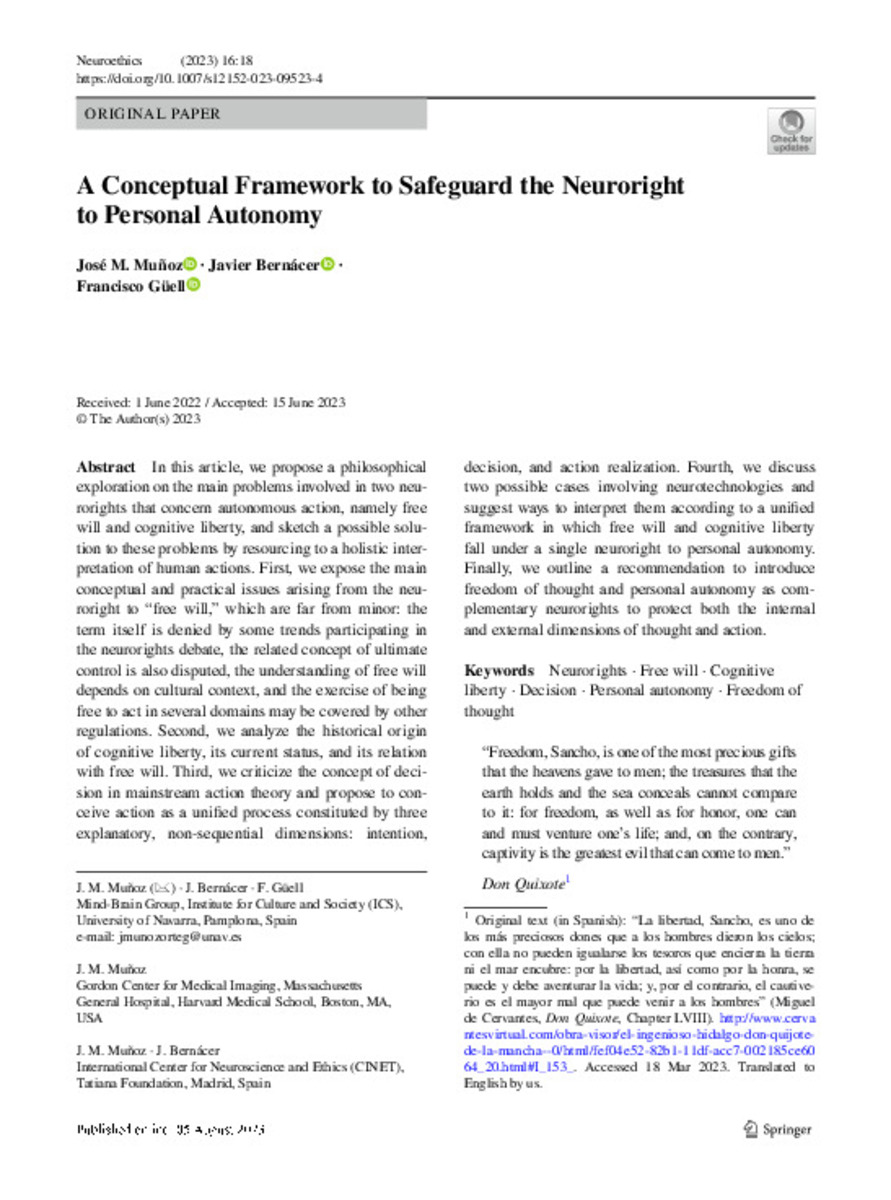Full metadata record
| DC Field | Value | Language |
|---|---|---|
| dc.creator | Muñoz, J.M. (José M.) | - |
| dc.creator | Bernácer-María, J. (Javier) | - |
| dc.creator | Güell-Pelayo, F. (Francisco) | - |
| dc.date.accessioned | 2023-12-22T09:16:15Z | - |
| dc.date.available | 2023-12-22T09:16:15Z | - |
| dc.date.issued | 2023 | - |
| dc.identifier.citation | Muñoz, J.M. (José M.); Bernácer-María, J. (Javier); Güell-Pelayo, F. (Francisco). "A conceptual framework to safeguard the neuroright to personal autonomy". Neuroethics. 16 (18), 2023, | es |
| dc.identifier.issn | 1874-5504 | - |
| dc.identifier.uri | https://hdl.handle.net/10171/68171 | - |
| dc.description.abstract | In this article, we propose a philosophical exploration on the main problems involved in two neurorights that concern autonomous action, namely free will and cognitive liberty, and sketch a possible solution to these problems by resourcing to a holistic interpretation of human actions. First, we expose the main conceptual and practical issues arising from the neuroright to “free will,” which are far from minor: the term itself is denied by some trends participating in the neurorights debate, the related concept of ultimate control is also disputed, the understanding of free will depends on cultural context, and the exercise of being free to act in several domains may be covered by other regulations. Second, we analyze the historical origin of cognitive liberty, its current status, and its relation with free will. Third, we criticize the concept of decision in mainstream action theory and propose to conceive action as a unified process constituted by three explanatory, non-sequential dimensions: intention, decision, and action realization. Fourth, we discuss two possible cases involving neurotechnologies and suggest ways to interpret them according to a unified framework in which free will and cognitive liberty fall under a single neuroright to personal autonomy. Finally, we outline a recommendation to introduce freedom of thought and personal autonomy as complementary neurorights to protect both the internal and external dimensions of thought and action. | es_ES |
| dc.description.sponsorship | JM and JB want to thank the Tatiana Foundation (https://fundaciontatianapgb.org/) for its valuable support of their research. JM, JB, and FG are grateful to the Mind-Brain Group at ICS and, especially, to Nathaniel Barrett, Ph.D., and also want to thank John Horden for his English language review of the manuscript. | es_ES |
| dc.language.iso | eng | es_ES |
| dc.publisher | Springer | es_ES |
| dc.rights | info:eu-repo/semantics/openAccess | es_ES |
| dc.subject | Neurorights | es_ES |
| dc.subject | Free will | es_ES |
| dc.subject | Cognitive liberty | es_ES |
| dc.subject | Decision | es_ES |
| dc.subject | Personal autonomy | es_ES |
| dc.subject | Freedom of thought | es_ES |
| dc.title | A conceptual framework to safeguard the neuroright to personal autonomy | es_ES |
| dc.type | info:eu-repo/semantics/article | es_ES |
| dc.description.note | This article is licensed under a Creative Commons Attribution 4.0 International License | es_ES |
| dc.identifier.doi | 10.1007/s12152-023-09523-4 | - |
| dadun.citation.number | 18 | es_ES |
| dadun.citation.publicationName | Neuroethics | es_ES |
| dadun.citation.volume | 16 | es_ES |
Files in This Item:
Statistics and impact
Items in Dadun are protected by copyright, with all rights reserved, unless otherwise indicated.






